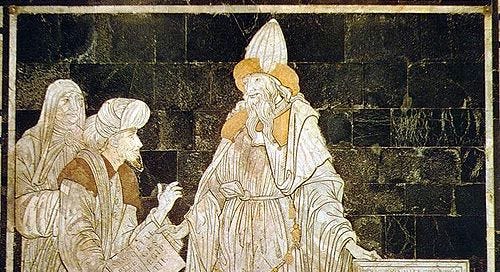Nothing will be left
to tell of your wisdom
but old graven stones.
Men will be weary of life,
and will cease seeing the universe
as worthy of reverent wonder.
Spirituality, the greatest of all blessings,
will be threatened with extinction,
and believed a burden to be scorned.
The world will no longer be loved
as an incomparable work of Atum;
a glorious monument
to his Primal Goodness;
an instrument of the Divine Will
to evoke veneration
and praise in the beholder.
Egypt will be widowed.
Every sacred voice will be silenced.
Darkness will be preferred to light.
No eyes will raise to heaven.
The pure will be thought insane
and the impure will be honoured as wise.
The madman will be believed brave,
and the wicked esteemed as good.
Knowledge of the immortal soul
will be laughed at and denied.
No reverent words worthy of heaven
will be heard or believed.




Every culture possesses its own worldview, a philosophy of how to be in the world. To me it seems that our civilization, as a whole, is no longer guided by any meaningful philosophy. Strict materialism and capitalism on steroids have gutted the sacred and led to a world where life’s meaning is defined only as the acquisition of more material things. Because of the official dogma in our society that everything is dead matter we have succumbed to the ubiquitous suggestion that we can only find meaning and happiness in acquiring more stuff. Yet, as Western lifestyles spread around the globe depression and unhappiness are at all-time highs.
But, remember...life is in constant flux. Someone said, I wish I remembered who, action absorbs anxiety. I strongly believe it’s very important that we don’t react to the slings of the world as victims, but respond as people who possess the sense of a different power, not power over, but power with life and with each other, a power that comes from our sense of sacred connection.
We are not passive in this world. Life doesn’t only happen to us…it also happens through us. Even in the worst circumstance we can, as Viktor Frankl says, choose our response to what is facing us. There is deep joy in that knowledge, and hope, a hope that opens within us a faith in life’s creative impulse, and in humanity’s ability to steer this impulse. Exactly because life is in constant flux our world view, our perceptive lenses, channels this endless change into our lived reality.
For all their baggage ancient traditions still offer wisdom and ways to cultivate within us values and practices which have withstood the test of time, and which ground us in our work. Values and practices such as being guided by the Good, the Beautiful, and the True which comes from the Western classical world, the value of ahimsa, nonviolence, from Indian philosophy, reciprocity with the natural world that sustains us which guides Native American cultures as well as the panentheism of paganism and other indigenous cultures, the practice of non-action mentioned in the Taoism, which doesn’t mean doing nothing but rather moving in harmony with of the flow of life, not against it. Buddhist mindfulness awakens in us the ability to see clearly what is the best response to the moment before us. The Bhagavad Gita reminds us not to be attached to the fruit of our actions. The Koran of Islam teaches Khalifa which includes upholding justice and fighting corruption, and Judaism has Tikkun Olam, making the world whole. Humanism upholds the dignity of every individual, Neoplatonism emphasizes our oneness, and Christianity exhorts us to practice Philia, love for our brothers and sisters who are everybody we meet.
Jane Goodall says, ‘Your life matters. You can't live through a day without making an impact on the world. And what's most important is to think about the impact of your actions on the world around you.’ We can never fully know what those will be. We are all affecting the world every moment, whether we mean to or not. So do it consciously, intentionally. The truth is we are often not aware of how what we do and say will ripple outward into the world. Practice of seeing the world we inhabit clearly in the moment, envisioning an image of the future we want to create, and releasing that creative vision with wisdom through our actions.
More like current events than prophecy.